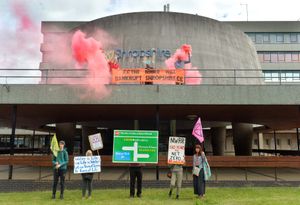£4.2 million Shrewsbury North West Relief Road grant poised to be clawed back
The Marches Local Enterprise Partnership is poised to withdraw £4.2 million in funding from Shrewsbury's controversial and much-delayed North West Relief Road project.

Members of the LEP board voted on Thursday afternoon to claw back the grant it awarded Shropshire Council in 2015, saying it had a “responsibility” to redistribute it to more deliverable projects. LEPs are non-statutory bodies responsible for local economic development in England.
But the decision is not set in stone yet – and will need to be confirmed by a written vote,as not enough representatives from member councils were present at the meeting.
The grant was initially made towards the Oxon Link Road, stretching from Churncote Island to Holyhead Road, but the entire relief road has since been brought together under a single planning application, which has sparked over 5,500 objections and been plagued by setbacks.
The scheme was expected to go before Shropshire Council’s northern planning committee for a decision last month, but was delayed again after the Environment Agency said it still had concerns.

Addressing the board, Shropshire Council’s director of place, Mark Barrow, said ongoing discussions with the agency around the environmental assessment were “coming to a conclusion”.
He said: “The confidence level in terms of being able to move that forward into formal consideration by the planning committee in the autumn is quite strong.”
Mr Barrow said the council could “dislocate” the Oxon section from the wider project if needed to ensure it can go ahead “irrespective of what happens with the North West Relief Road”.
He also said the Oxon Link Road formed a key part of the Shrewsbury West Sustainable Urban Extension, which was already seeing progress in terms of house building and interest from businesses in the planned commercial units.
Board chair Sonia Roberts said it was good to hear about the economic benefits but added: “The LEP did buy a road, and a road is the key requirement we are looking for here.”
Ms Roberts told members the board’s decision could have “significant” repercussions for the council.
However, she said delaying a decision to claw back the funds would reduce the time available to re-distribute it, with the Government expected to abolish LEPs next year.
She added: “There’s also a significant chance that this project could go to judicial review, and if that’s the case it will add at least 18 months and considerable financial cost on to the project.”
Ms Roberts also said the LEP had taken legal advice to confirm that clawback was an option.
The money came from the first round of the Government’s Local Growth Fund, from which the LEP secured £75.3m in 2014.
LEP chief executive Rachel Lever said that if the link road grant was recouped, new bids would be invited and the money would need to be re-allocated in line with the original funding requirements, namely to projects aimed at delivering new housing and employment sites and local jobs growth.
In theory, this could mean the council would be able to re-apply for the grant.
Ms Lever said: “Eight years ago we funded this scheme and it’s been back to the board a lot of times over the years.
“I’m concerned about how it looks for LEP, because we are given the money to allocate to projects to deliver, and we are eight years on and it hasn’t delivered yet.
“I can understand that the council are committed to it still. If they do get planning permission for it, and it does go to judicial review, we are in danger of having funded a scheme 10 years ago that still hasn’t got a shovel in the ground.
“I don’t think that reflects well on the LEP and our ability to manage the money effectively.”
Board member Frank Myers said: “That money could be doing something useful somewhere else.
“That for me is the only responsible way forward, because to delay any further – after all the delays we’ve given – potentially leaves it forever, as [the LEP] might not even be around.
“I think we’ve got a responsibility to say enough’s enough, and that money must go in a different direction.”
Ms Lever told members the LEP would have the funds to continue for one more year after the expected withdrawal of government backing in 2024, so it would have time to re-distribute the money. However she said if a decision on potential clawback was delayed it would be more difficult.
Four members voted to trigger the clawback, while three voted to request an updated business case to be discussed at the November board meeting.
The resolution to claw back the funds will now be put to all board members who will be asked to confirm their votes in writing, with the outcome to be confirmed at a later date.





